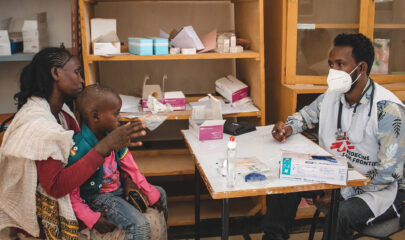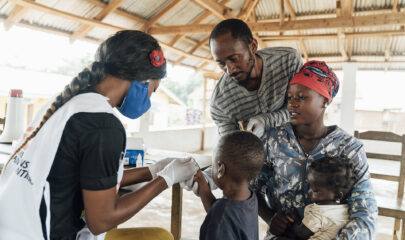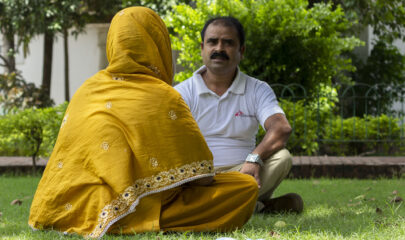Sexual violence has become a serious public health concern in Central African Republic (CAR) over the past decade. In a country marked by years of civil war, assaults are perpetrated not just by members of armed groups but often by someone known to the survivor. While access to medical and psychological care has improved, the response remains insufficient compared to the needs.
“After the assault, I thought I would take my own life,” says Charlotte*, an 18-year-old survivor of sexual violence from CAR’s capital, Bangui.
Charlotte was living with her aunt and uncle when her uncle raped her one day at home. Her aunt did not believe her, and Charlotte felt alone and desperate. She went first to the police without success and, after talking to a close cousin, decided to seek help.
Charlotte was physically and mentally affected when she arrived at the Tongolo support centre run by Doctors Without Borders/Médecins Sans Frontières (MSF). Tongolo means ‘star’ in Sango, the local language, and refers to hope. Charlotte is one of over 6,000 survivors of sexual violence who have received medical, psychological and psychosocial care from MSF teams since the Tongolo healthcare project opened in Bangui in 2017.
Célestin*, another survivor from Bangui, also felt trapped and did not expect such a traumatic event would happen to him. He innocently offered shelter to a person he thought he knew, until he was sexually harassed one night.
“I was sleeping, and he came out of nowhere with bad intentions,” says Célestin. “He was drunk and forced me to do things I did not want to. I started to panic, I was so scared. He beat me but I managed to escape.”
In August 2020, MSF opened the Tongolo centre, an area of the health facilities dedicated to care for survivors of sexual violence.

WOMEN AND MINORS, MAIN GROUPS AFFECTED BY SEXUAL VIOLENCE
Most survivors come from Bangui, where 890,000 of the country’s 4.5 million people live. However, one in four patients are from the capital’s outskirts, and a tiny fraction, which is increasing, from remote areas in other provinces.
“The Tongolo initiative strives to provide a high quality and free program of complete care accessible for everyone,” says Bilge Öztürk, the project coordinator.
While the majority of patients are women and girls (over 1,900 in 2020, or nearly 95 per cent), 111 men also sought care last year. Minors made up 52 per cent of survivors, a figure labelled as alarming by Axelle Franchomme, Tongolo’s medical adviser.
Minors are the most vulnerable and sensitive people to care for, as they are building their identity based on situations they experience.
A CHRONIC CRISIS CONDUCIVE TO SEXUAL VIOLENCE
With CAR ravaged by years of civil war and people repeatedly exposed to forceful displacement, high levels of violence and human rights abuses, sexual violence has also become a public health concern.
Years ago, most survivors identified armed men as aggressors. With the wider program, MSF teams have learned perpetrators are often known to survivors and are part of their close circle. In 2020, 56 per cent of patients seen by MSF said they knew their perpetrators. With renewed violence in December 2020, this trend has been reversed and armed actors are again the most frequent aggressors.
The aftermath of assault comes with more challenges.
“For the family, when a relative is sexually assaulted, the fault is on the person who was abused. They do not realize they could be abused themselves,” says Aimé-Césaire, a mental health counsellor.
This also translates into how patients communicate. Some Central African languages do not use the word ‘rape’ because it is considered taboo and shameful.
“The objective is to accompany survivors in their healing journey,” says Tongolo’s medical adviser.
“Silence leads to smashed ambitions, broken families, sickness, dysfunctional relationships and ruined lives,” says Gisela Silva, a mental health supervisor.
INVISIBLE SCARS
The invisible consequences of sexual violence range from post-traumatic stress disorder and anxiety to depression. Some also have ideas of suicide and even attempt it. As the subject remains taboo, survivors are forbidden in most cases from talking about the sexual assault they went through because of the shame it could bring on the family.
The problem is then resolved within the community or between family members, forgetting this is a medical emergency.
For male survivors, the situation is also complicated. They are scared, reluctant to ask for help because of community pressure and stigmatization.
In this complex environment, access to psychosocial support is essential to prevent or reduce psychological illness and suffering caused by sexual violence.
Since the health and mental health needs of survivors cannot be adequately addressed without considering their social world, survivors are connected to a social worker as well.
“The objective is to accompany survivors in their healing journey, to help them solve their problems and become strong enough to resume their lives,” says medical adviser Franchomme.

SEEKING HELP EARLY IS CRUCIAL
Following rape, treatment that prevents HIV and other sexually transmitted infections, as well as vaccinations against hepatitis B and tetanus, must be carried out as soon as possible, within three days of the event. However, in 2020, only 26 per cent of patients seen by MSF arrived within 72 hours of a sexual assault. Community health workers and radio spots raise awareness of this need.
Once medications are given, follow-up visits check treatment adherence to prevent possible side effects or complications. Patients can also receive emergency contraception to prevent unwanted pregnancy. Family planning options are offered to everyone in all Tongolo facilities to mitigate stigmatization linked to a child born out of rape.
UNCOVERED NEEDS
While seeking help as early as possible and sharing the traumatic experience with mental health specialists are vital to heal visible and invisible wounds of sexual violence, rebuilding the future after the aggression can be a daunting task due to legal and socioeconomic needs.
There are currently few services available in this field in CAR. Impunity is also linked to sexual violence, with criminal procedures only happening in the capital.
In the Tongolo centre, there is a space to host local and international organizations specialized in legal, protection, education and socioeconomic support so survivors can access all services in one place.
There is still a long way to go to identify, treat and adequately assist all survivors of sexual violence in CAR.
*Patients’ names changed to protect their identity.
MSF has been working in CAR since 1997, with 13 projects in Bangui, Bria, Bangassou, Bambari, Kabo, Batangafo, Paoua, Bossangoa and Carnot. A sexual violence component has been integrated in all projects.


